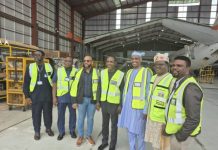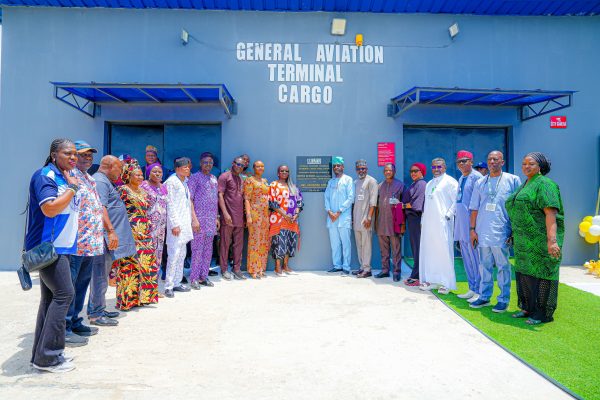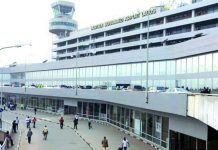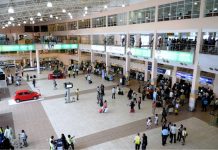The Federal Airports Authority of Nigeria (FAAN) has officially commissioned a new domestic cargo terminal at the General Aviation Terminal (GAT), Murtala Muhammed Airport in Lagos—marking a major milestone in Nigeria’s drive to modernize aviation logistics and boost non-oil exports.
The terminal, which was inaugurated on May 9, 2025, is equipped with cutting-edge facilities including cold storage units, automated handling systems, secured loading bays, and dedicated customs clearance areas. Built to meet international standards, the new terminal is expected to enhance the speed, efficiency, and reliability of cargo movement across the country—particularly for time-sensitive goods like agricultural produce and e-commerce deliveries.
Speaking during the commissioning, FAAN Managing Director/CEO, Mrs. Olubunmi Kuku, described the terminal as a bold step toward sustainable economic growth. Represented by FAAN’s Director of Commercial and Business Development, Mrs. Adebola Joy Agunbiade, Kuku noted that the project is part of a broader strategy to decentralize cargo operations and create a strong logistics backbone nationwide.
“This facility was designed precisely for this moment—to accelerate trade, enhance operational efficiency, and position us for the future,” Kuku said. “It will serve as a gateway for efficiency, scalability, and better logistics, while contributing significantly to our national economic diversification goals.”
The development aligns with a strategic roadmap under the Ministry of Aviation and Aerospace Development, championed by Minister Festus Keyamo and executed through the Directorate of Cargo Development and Services led by Mr. Lekan Thomas. The roadmap includes similar cargo terminals in key airports across Abuja, Kano, Jos, and Niger, with Public Private Partnership (PPP) models being considered to enhance delivery and sustainability.
FAAN emphasized that Lagos—Nigeria’s commercial nerve centre—was a natural starting point for the cargo infrastructure rollout, given its high freight traffic and centrality to regional trade. With this new facility, Lagos is expected to attract more freight operators and further establish itself as a key node in West Africa’s logistics network.
Industry stakeholders have welcomed the development, noting that the new terminal addresses longstanding bottlenecks in Nigeria’s cargo ecosystem. It is projected to significantly reduce dwell time, streamline customs processes, and boost the nation’s capacity for both domestic and international cargo movement.
Director of Cargo Development, Mr. Thomas, highlighted that Nigeria handled approximately 174,000 metric tonnes of air freight in 2023—65% of which were imports. However, exports, particularly of agricultural goods and solid minerals, are on the rise. The terminal is therefore positioned as a critical enabler of that growth, especially under the African Continental Free Trade Area (AfCFTA).
“With global demand for Nigerian exports increasing and e-commerce surging, this terminal provides the tech-driven logistics platform required to meet modern supply chain expectations,” Thomas said. “It’s a testament to progress, collaboration, and purpose-driven leadership.”
In addition to economic benefits, the terminal is expected to open new revenue streams for FAAN, while creating employment opportunities and supporting businesses across Nigeria. As Kuku noted, “Cargo is the lifeblood of commerce. This terminal is not just infrastructure—it’s a catalyst for growth, trade, and national development.”
















